SellerSheet Documentation
Seamlessly synchronize Amazon Seller Central data with Google Sheets.
SellerSheet connects directly to Amazon's SP-API and Ads API, enabling automated data retrieval, analysis, and management within the familiar Google Sheets interface.
Dashboard Authorization
Use the SellerSheet Dashboard to securely authorize your Amazon Stores. This is where you connect your Seller Central account so SellerSheet can fetch your data.
Sidebar Installation
Install the SellerSheet Sidebar from the Workspace Marketplace. This adds the SellerSheet sidebar to your spreadsheets.
This documentation outlines the setup process, authentication workflows, and module-specific functionalities.
Prerequisites
- Active Amazon Professional Seller Account
- Google Account (Workspace or Personal)
- Chrome Browser (Recommended)
Quick Start Guide
SellerSheet seamlessly synchronizes your Amazon Seller Central data with Google Sheets. Features include automated order syncing, comprehensive business reports, multi-store support, and simple team sharing.
1. Account Creation
Access the SellerSheet Portal to create your account.
- New Users: Click Continue with Google to create your account.
- Returning Users: Can also use Continue with Email to login via OTP.
- Use the same Google Account you use for Google Sheets.
- You will be redirected to the Dashboard upon success.

2. Store Authentication
2.1 Authorize Amazon Store
- Navigate to the Dashboard.
- Click the Add Store button.
- Enter a friendly Store Name (e.g., "My Amazon US").
- Select the Region. Important: Ensure the region matches your Amazon Seller Central account.
- Click Authorize Store to be redirected to Amazon for approval.
2.2 Authorize Advertising
- Once the store is listed, click Authorize Ads.
- Click Confirm to be redirected to Amazon Ads.
- Click Allow on the Amazon page.
- You will be redirected back. The ADS AUTH column will show the authorization date.
2.3 Team Access
- Click the Share button.
- Input the email address and click Share Store.
- Current Access lists existing users; Shared to confirms the new addition.
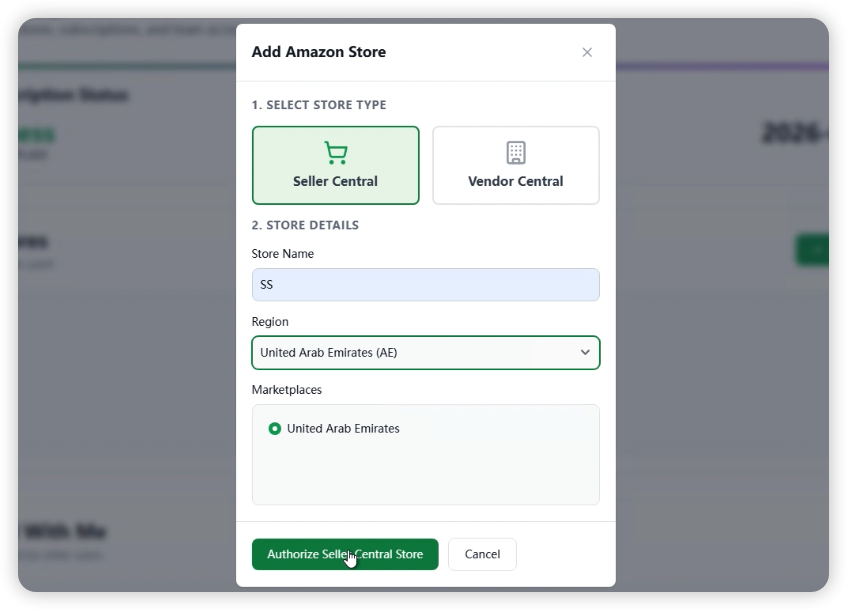
3. Sidebar Installation
- Go to the Google Workspace Marketplace Listing.
- Click Install (or "Admin Install" for Workspace domains).
- Follow the prompts to grant permission to your Google Account.
- Open a new Google Sheet (or type
sheet.new). - Go to Extensions → SellerSheet → Open Sidebar.
- The add-on will initialize and create the "SellerSheet" folder structure in your Drive.
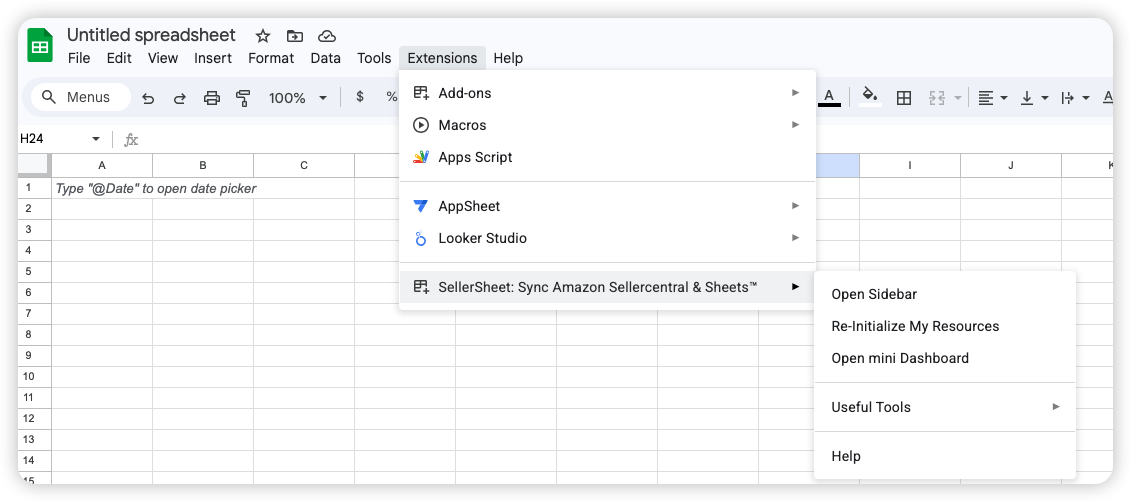
4. Sync Orders
Verify your setup by retrieving your first batch of data.
- In the Sidebar, expand the Sales tab.
- Click the Sync Orders button.
- The Orders sheet in the "SellerSheet Sales" spreadsheet will populate with your recent 30 days of orders.
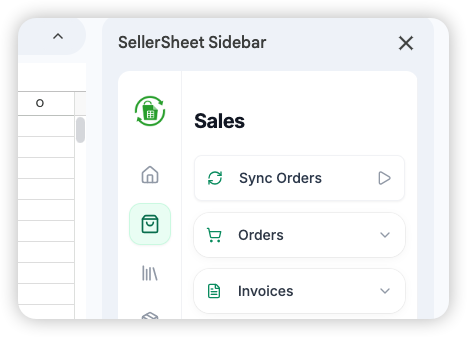
Home Tab
The Home Tab is your central base in the sidebar. It hosts your essential tools and provides quick access to everything SellerSheet has created for you.
Documentation
Click this to open this guide. Useful for new users to get started quickly.
Mini Dashboard
Your cockpit for account management. Opening the Mini Dashboard allows you to monitor:
- Subscription: Check your current plan and expiry.
- API Quotas: Real-time tracking of your SP-API and Ads API usage.
- Stores: Secondary view of your owned and shared stores.
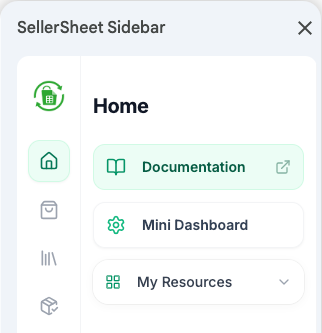
Home Tab Main Overview
My Resources
The My Resources panel in the Home tab shows everything SellerSheet has created for you — folders, spreadsheets, and connected stores. It's also your safety net: if anything goes missing, this is where you fix it.
What SellerSheet Creates
When you first open the sidebar, SellerSheet builds a SellerSheet folder in your Google Drive containing:
- Folders: Organized storage for Invoices, Reports, Images, etc.
- Spreadsheets: Pre-built templates for Sales, Catalog, Store Reports, FBA, A+, etc. Each spreadsheet contains multiple sheets (tabs) for sub-features.
- My Stores: Stores you authorized on the SellerSheet Dashboard.
- Shared With Me: Stores other team members have shared with you.
How SellerSheet Tracks Resources
SellerSheet remembers each folder and spreadsheet by its ID. If the resource still exists, SellerSheet keeps using it. If it's been deleted or can't be found, SellerSheet creates a new one and remembers the new ID going forward.
This means you can safely delete, rename, or reorganize — SellerSheet always adapts.
Recovery & Starting Fresh
My Resources doubles as a self-repair tool. Click any item's link or use Re-Initiate Resources at the bottom — SellerSheet checks every folder, spreadsheet, and sheet tab by name. If the exact name is missing, it creates a fresh template. Resources that already exist are left untouched.
Deleted something by accident?
Click the missing item's name in My Resources, or click Re-Initiate Resources. SellerSheet creates a new resource and remembers it automatically.
Want a clean sheet template?
Rename the existing sheet tab (e.g.,
Invoices→Invoices - Backup), then click Re-Initiate Resources. SellerSheet sees the original name as missing and creates a fresh template alongside your renamed copy.Want to keep a full backup?
Use File → Make a copy to duplicate the entire spreadsheet or folder first. Then clear the data in the original. SellerSheet continues using the original because the ID hasn't changed — your backup is safely separate.
Important
Recreated sheets are empty templates — your previous data is not restored. Always make a copy first if you need to preserve existing data.
Important Rule
You can only run actions for stores that appear in your "Store" column. Always ensure the sheet tab you are on matches the dropdown menu you use in the sidebar.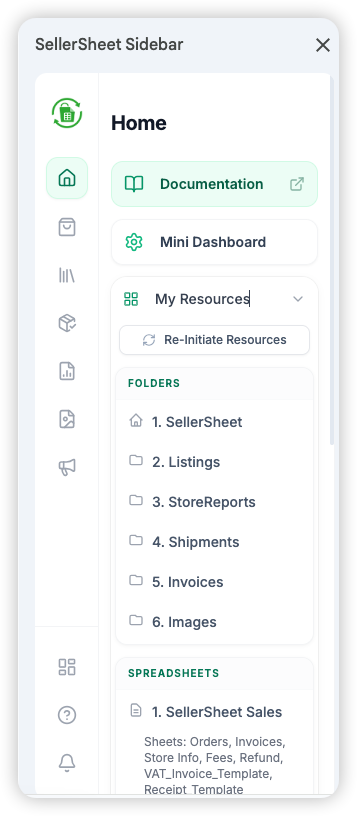
Folders & Spreadsheets
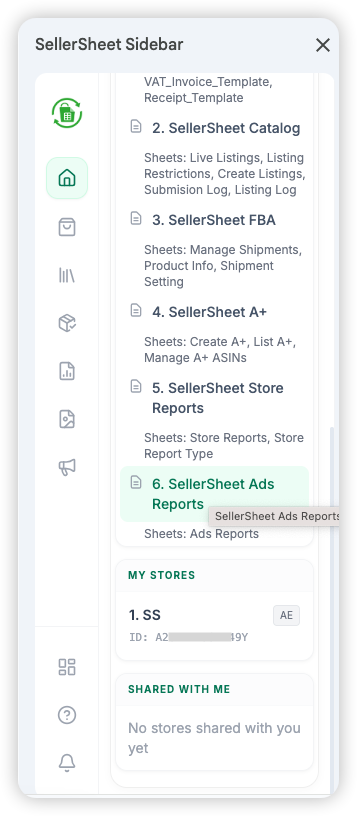
Store Management
Sales Tab
The Sales Tab is the central hub for your transaction management. It handles everything from syncing real-time Amazon data to generating professional invoices and tracking detailed fee breakdowns.
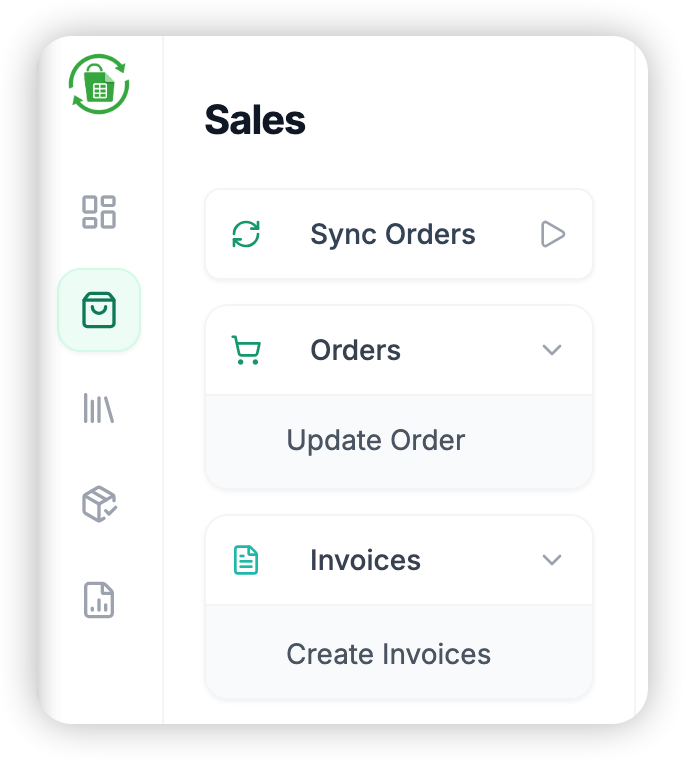
Sales Tab Sidebar View
Detailed Menu Actions
| Menu Item | Applies To | Works in Sheet | Purpose | Requirements |
|---|---|---|---|---|
| Sync Orders | Entire Sheet | Any Sheet | Sync orders, fees, and refunds from Amazon. First sync: 30 days. auto-syncs or manual sync. | Authorized Amazon store |
| Update Order | Selected Row | Orders | Manually update a specific order with latest data from Amazon. | Order ID in Orders sheet |
| Create Invoices | Entire Sheet | Invoices | Generate invoices (VAT/Receipt) and save to Google Drive. | Order exists in Orders sheet |
SellerSheet Sales Spreadsheet Sheets
| Sheet Name | Purpose |
|---|---|
| Dashboard | Summary overview of sales metrics aggregated from Orders, Fees, and Refund sheets. |
| Orders | Complete order info with all transaction details synced from Amazon. |
| Fees | Detailed fee breakdown (FBA fees, commissions, charges) for each order. |
| Refund | Refund records and amounts for returned orders. |
| Invoices | Generated invoices with Google Drive links and upload tracking. |
| Live Listings | Active product listings currently available on Amazon. |
| Store Info | Store config required for invoice generation. |

Core Sales Modules
Orders Sheet
Complete order information synced from Amazon. Contains all transaction details including pricing, shipping, taxes, and order status.
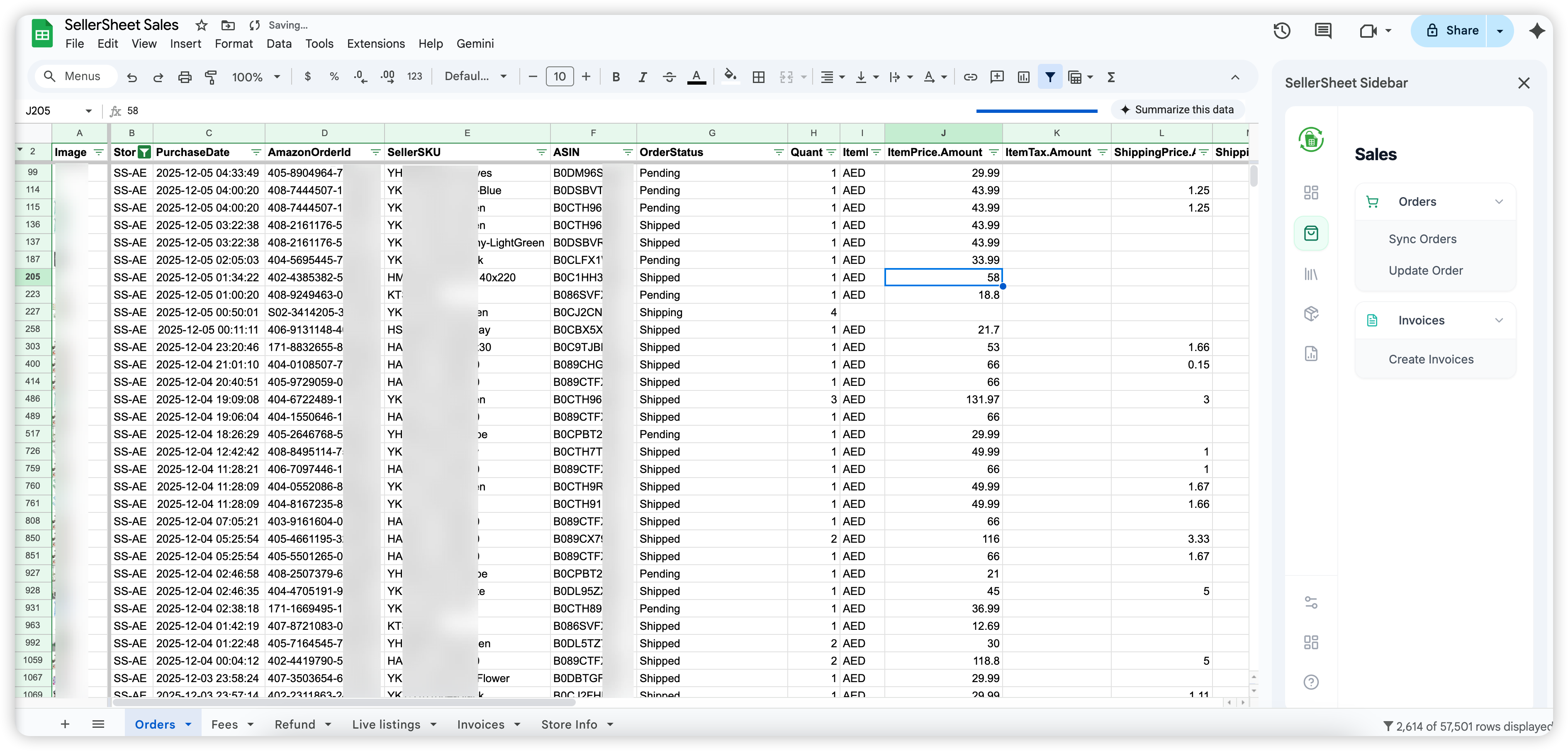
Orders Sheet Structure
Fees Sheet
Detailed fee breakdown for each order including FBA fees, commissions, charges, and taxes.
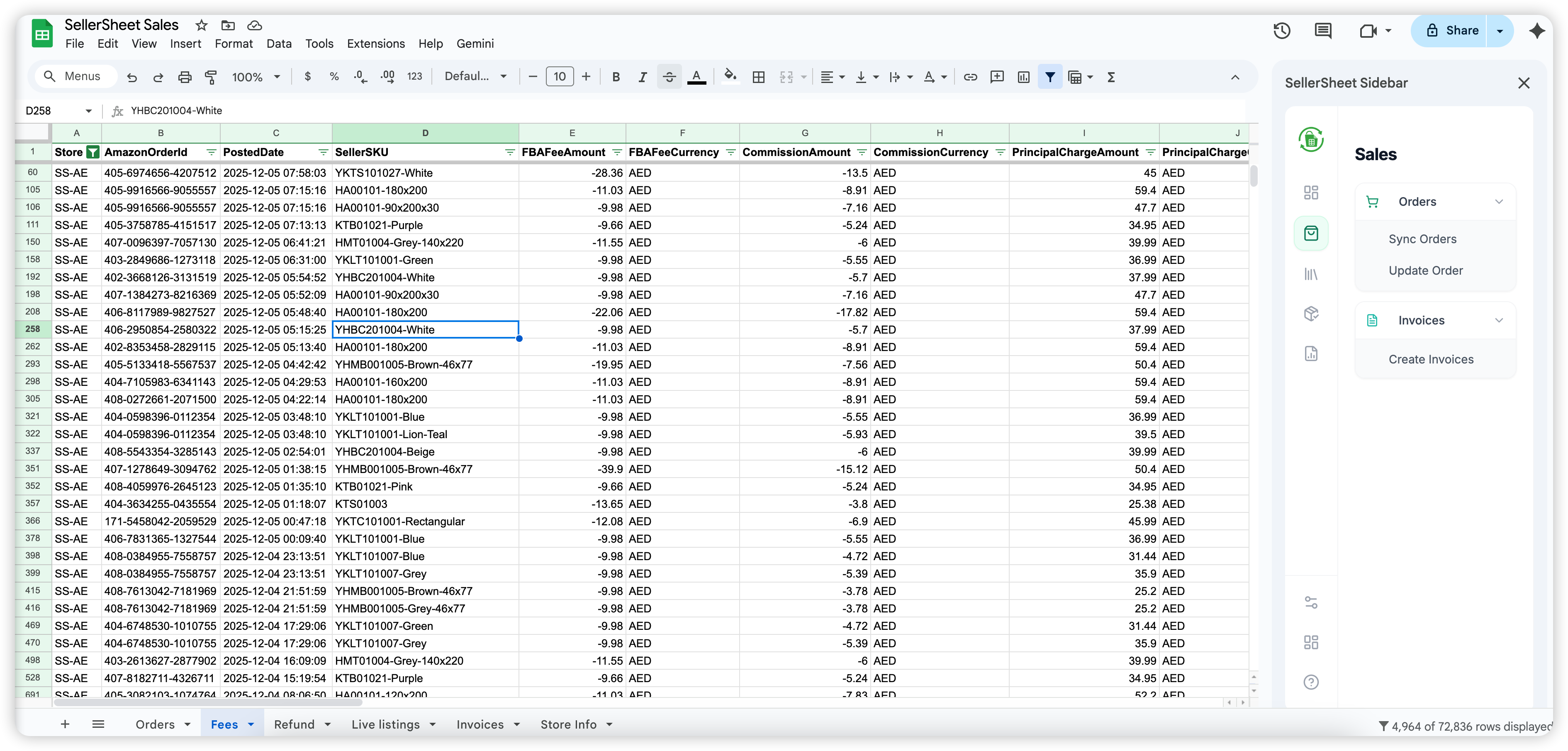
Fees Sheet Structure
Refund Sheet
Refund records and amounts for returned orders.
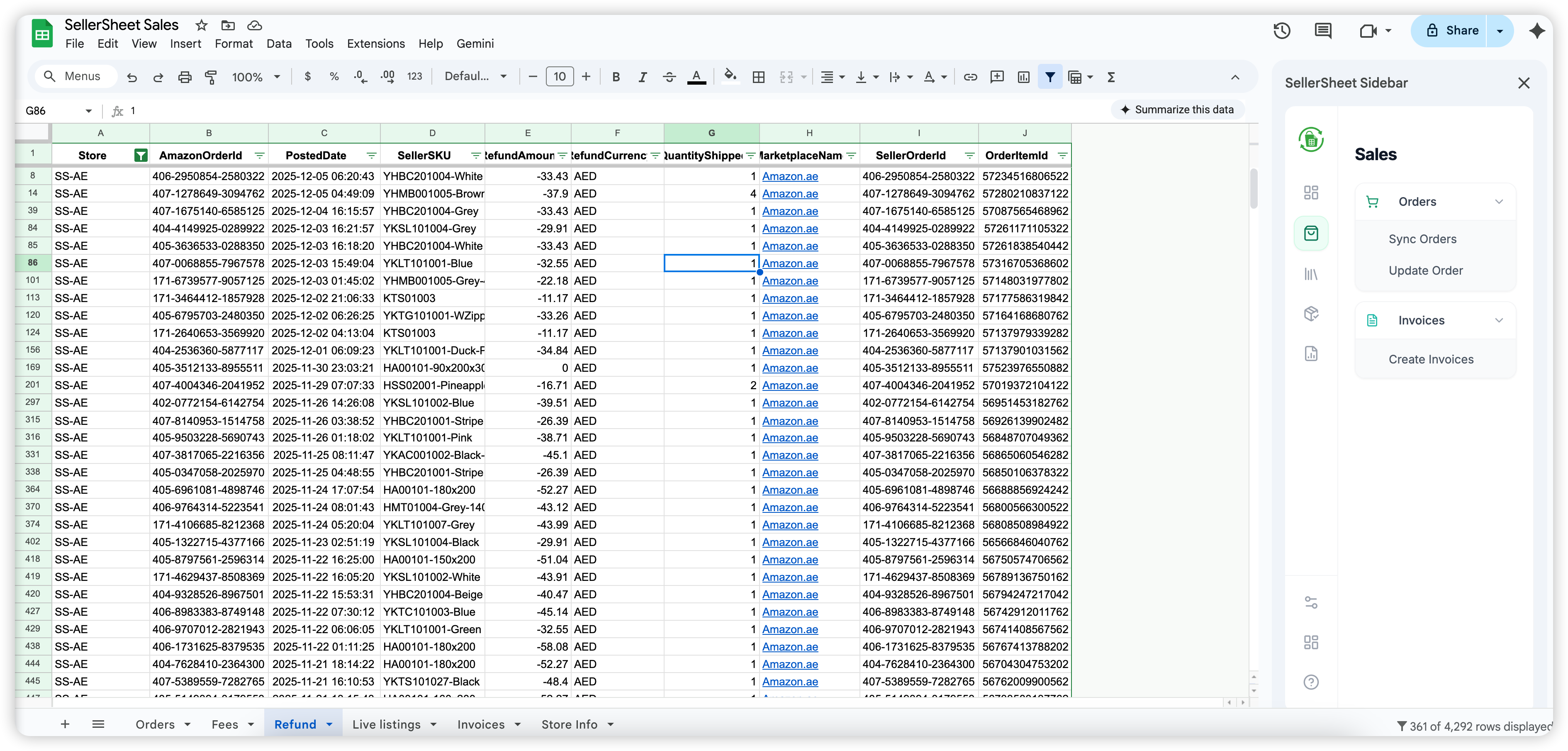
Refund Sheet Structure
Live Listings Sheet
Active product listings currently available on Amazon.
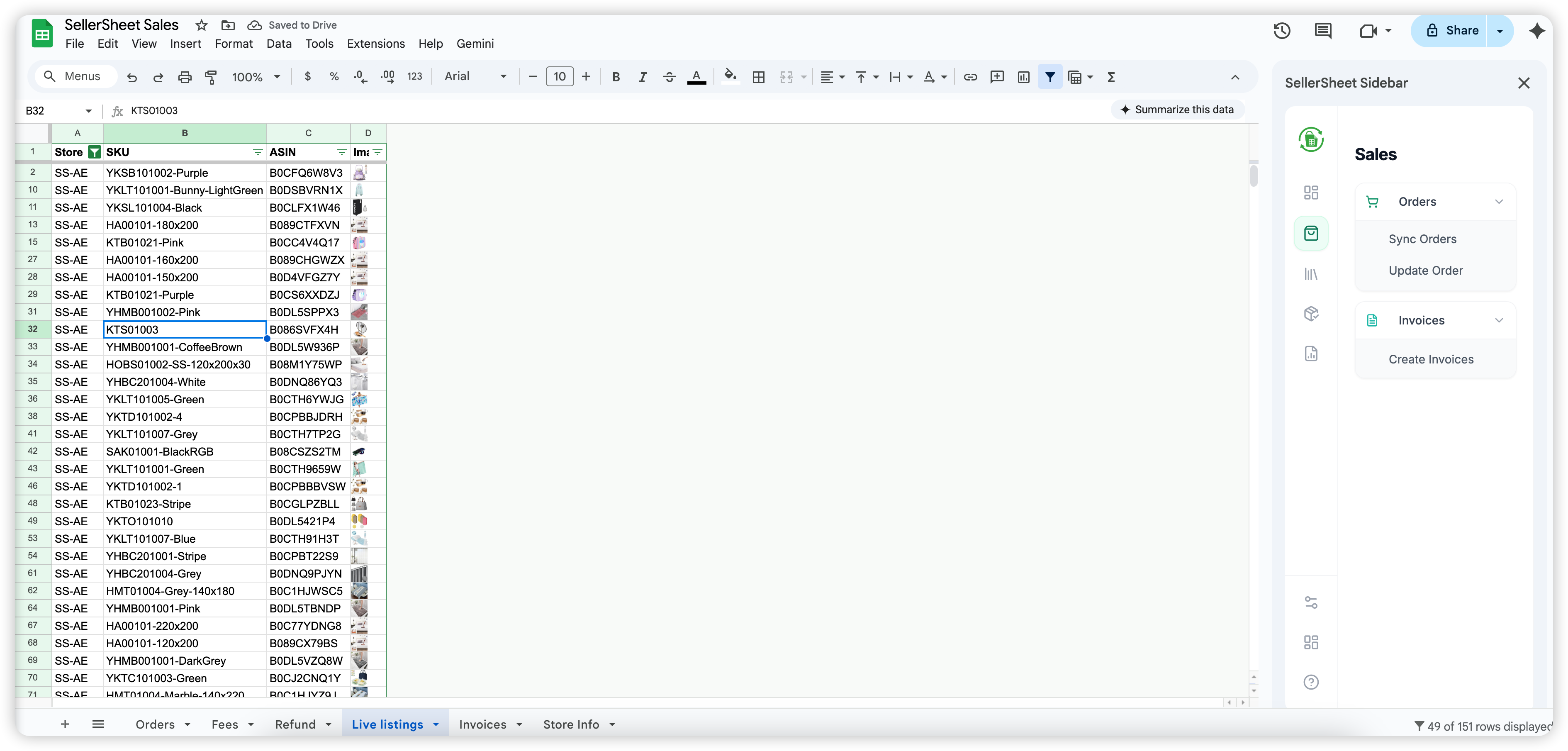
Live Listings Structure
Invoices Sheet
Generated invoices with Google Drive links and upload tracking. Fill required fields and click Create Invoices to auto-generate.
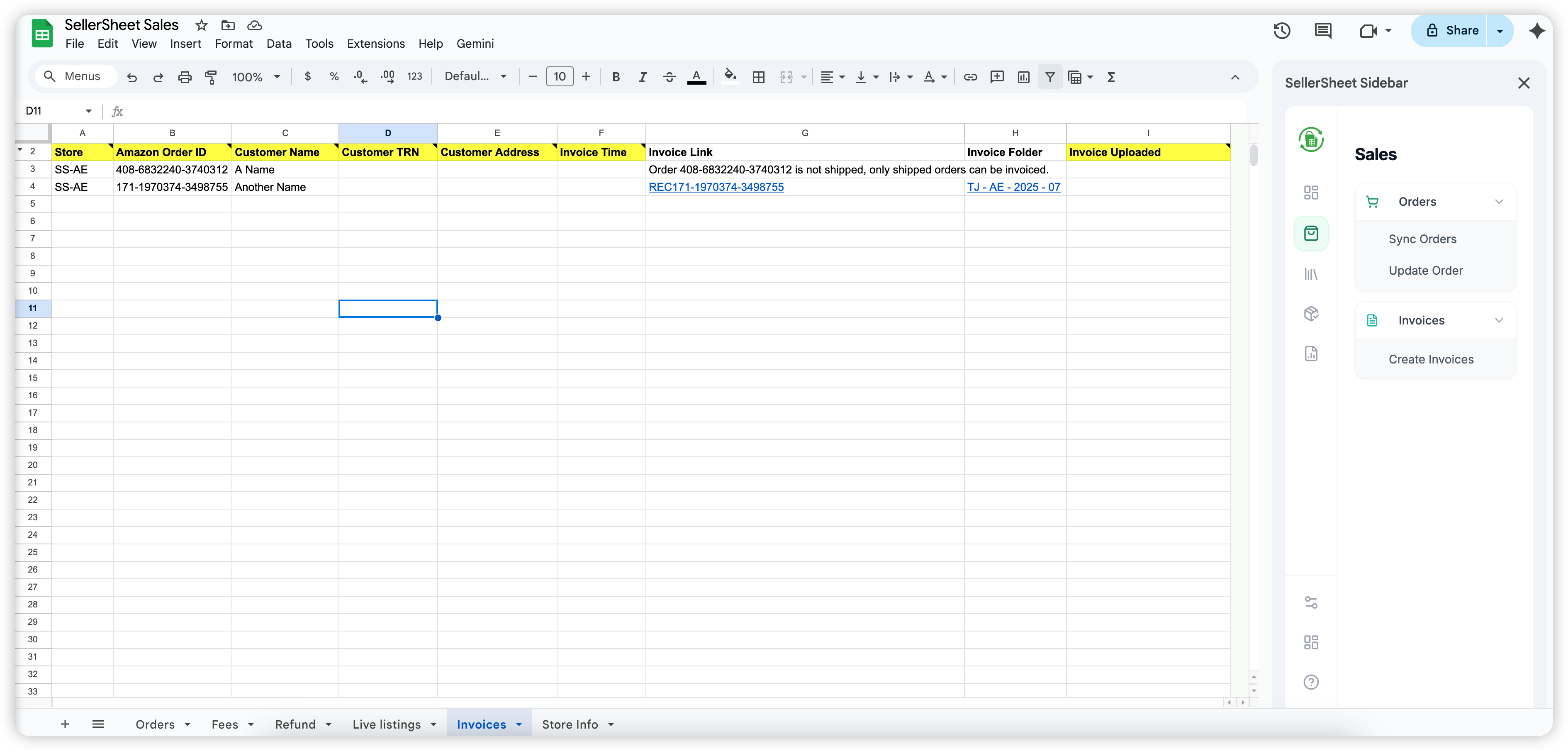
Invoices Sheet Structure
Column Details
| Column | Type | Description | Sample |
|---|---|---|---|
| Store | Required | Store name matching Store Info sheet. | SS-AE |
| Amazon Order ID | Required | Order ID from Orders sheet. Must be shipped. | 408-68322... |
| Customer Name | Required | Bill-to name for the invoice. | John Smith |
| Invoice Link | Auto-filled | Hyperlink to PDF on Drive. | REC-408... |
Store Info Sheet
Store configuration required for invoice generation. Fill this sheet before creating invoices.
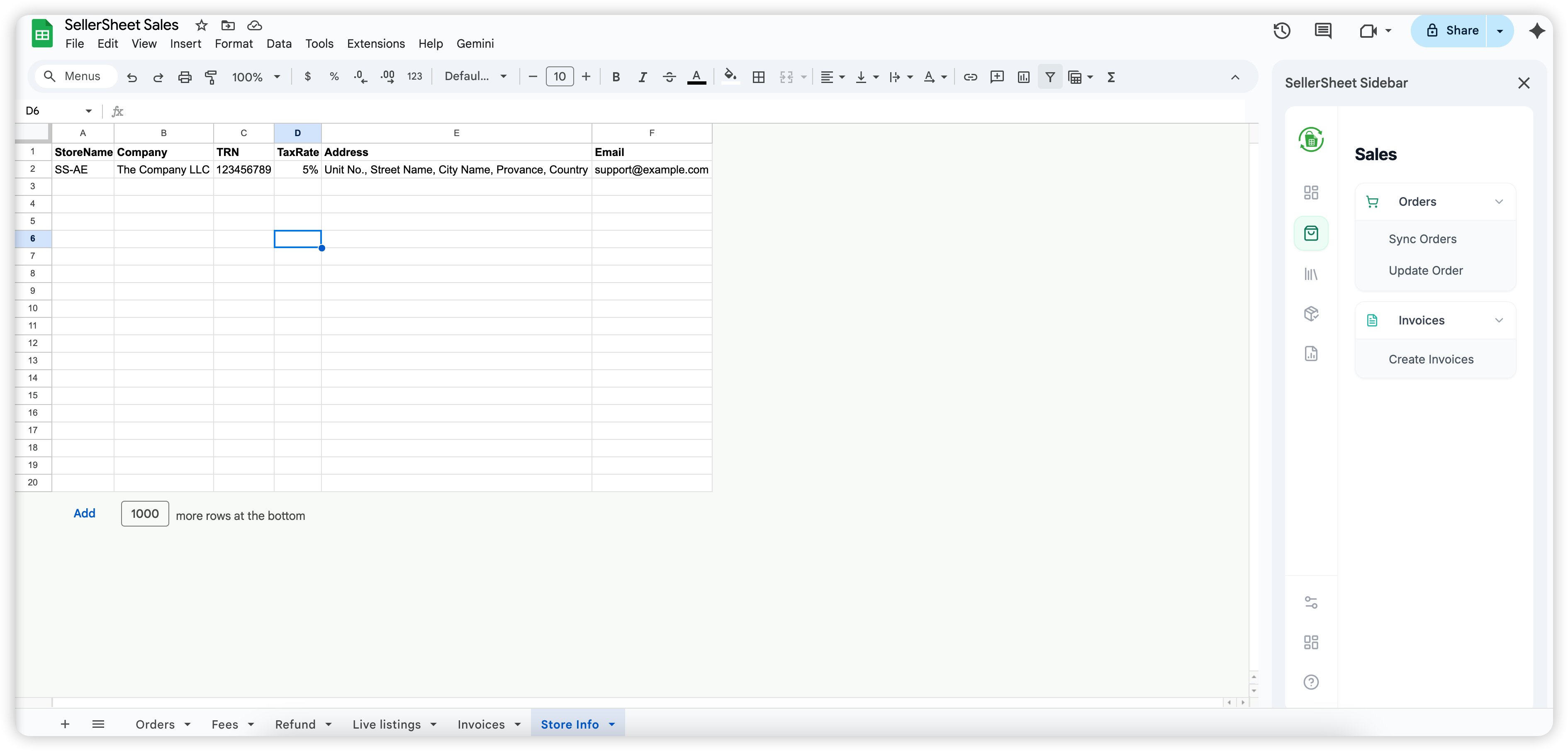
Store Info Sheet Structure
Column Details
| Column | Type | Description | Sample |
|---|---|---|---|
| StoreName | Required | Primary identifier. Must match authorized store. | SS-AE |
| Company | Required | Legal entity name for invoice header. | The Company LLC |
| TRN / TaxRate | Optional | If empty, generates Receipt instead of VAT Inv. | 123... / 5% |
Invoice Type: If TRN or TaxRate is not provided, SellerSheet will create a RECEIPT (REC) instead of a VAT Invoice (INV). Both TRN and TaxRate must be filled to generate VAT Invoices.
Dashboard Sheet
Summary overview of sales metrics aggregated from Orders, Fees, and Refund sheets.
Advertising (PPC)
Manage campaigns and analyze performance metrics across Sponsored Products, Brands, and Display.
Available Actions
- Campaign Manager: View and adjust bids/budgets.
- Performance Reports: Download search term reports and placement data.
Inventory Management
Monitor stock levels across FBA and FBM fulfillment channels.
Catalogs & Listings
Comprehensive listing management including content optimization, AI-powered listing generation, restriction analysis, and listing submission tracking.
Catalogs Tab in Sidebar
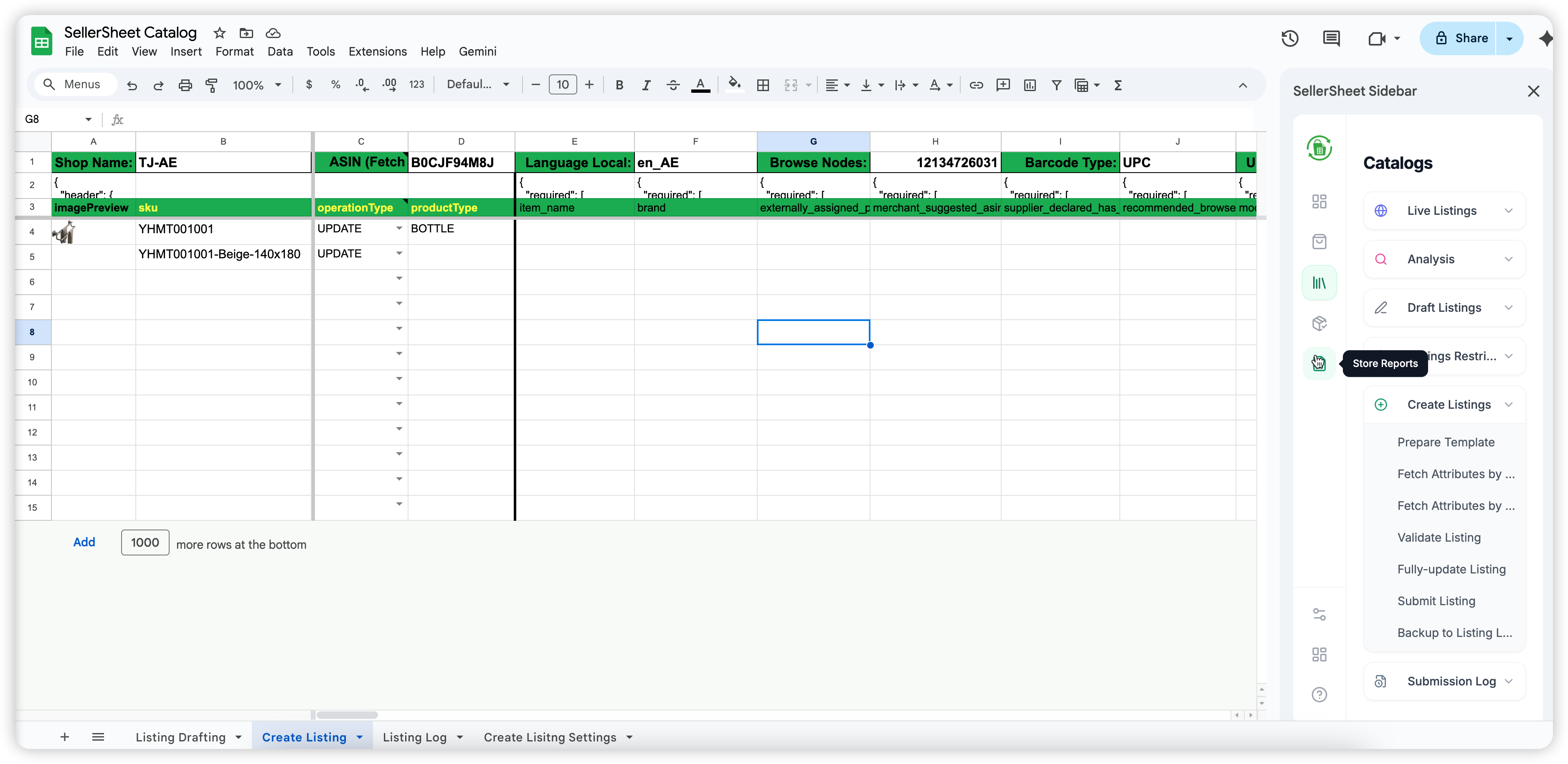
Menu Items
| Menu Item | Applies To | Works in Sheet | Purpose | Requirements |
|---|---|---|---|---|
| Fetch Listing (SKU) | Selected Row | Live Listings | Fetch listing data by SKU when Store and SKU are available and ASIN is not available. | Store and SKU filled, ASIN empty |
| Fetch Listing by ASIN | Selected Row | Analysis | Fetch listing data by ASIN. Retrieves Image, Title, Bullet points, and Description for analysis. | Store and ASIN filled |
| Copy to Drafting Sheet | Entire Sheet | Analysis | Copy listings from Analysis sheet to Draft Listings sheet for further editing and optimization. | Data in Analysis sheet |
| Fetch Listing by ASIN | Selected Row | Draft Listings | Fetch listing data by ASIN when Store and ASIN are available and Image is not available. | Store and ASIN filled, Image empty |
| Image to Listing (AI) | Selected Row | Draft Listings | Generate listing content from images using AI for the active row. | Row selected with Image available |
| Optimize Selected | Selected Row | Draft Listings | Optimize selected listings with AI for the active row. | Row selected |
| Translate Listing | Selected Row | Draft Listings | Translate listing for multiple marketplaces for the active row. | Row selected |
| Get Restrictions | Entire Sheet | Listings Restrictions | Get listings restrictions information for all rows with Store and ASIN available. | Store and ASIN filled in rows |
| Prepare Template | Entire Sheet | Create Listings | Prepare listing template with required structure and settings. | None |
| Fetch Attributes by ASIN | Entire Sheet | Create Listings | Fetch listing attributes by ASIN for all rows with ASIN filled. | ASIN filled in rows |
| Fetch Attributes by SKU | Entire Sheet | Create Listings | Fetch listing attributes by SKU for all rows with SKU filled. | SKU filled in rows |
| Validate Listing | Entire Sheet | Create Listings | Validate listing data before submission to check for errors or missing required fields. | Listing data filled in rows |
| Fully-update Listing | Entire Sheet | Create Listings | Fully update existing listing with all provided attributes. | Listing data filled in rows |
| Submit Listing | Entire Sheet | Create Listings | Submit new listing to Amazon via Feeds API. Auto-fills Submission Log with Feed ID and processing status. | Validated listing data in rows |
| Backup to Listing Log | Entire Sheet | Create Listings | Backup submitted listings from Create Listings sheet to Listing Log sheet for record keeping. | Submitted listings in Create Listings sheet |
| Update Log | Entire Sheet | Submission Log | Update submission log with latest processing status and summary from Amazon Feeds API. | Feed ID available in rows |
SellerSheet Catalogs Spreadsheet Sheets
| Sheet Name | Purpose |
|---|---|
| Live Listings | Audit active ASINs currently buyable on Amazon. Contains full listing attributes in JSON format. |
| Analysis | Analyze and compare listing data fetched by ASIN. Use fetched values to compose your own listings. |
| Draft Listings | Create and optimize listing content using AI. Generate listings from images, optimize existing content, and translate for multiple marketplaces. |
| Listing Restrictions | Check for brand gating or category restrictions that may prevent listing creation. |
| Create Listings | Prepare, validate, and submit new listings or update existing listings to Amazon. |
| Submission Log | Track status of listing submissions (Feeds API). Monitor processing status and summaries. |
| Listing Log | Backup storage for submitted listings from Create Listings sheet. |
Live Listings Sheet
Audit active ASINs currently buyable on Amazon. Contains full listing attributes in JSON format that can be used in Create Listings sheet.

Key Columns:
- json: Contains full attributes of the SKU in JSON format. Can be used in Create Listings sheet under item_name to replicate the listing.
- status: Values can be DISCOVERABLE, BUYABLE, or both. If BUYABLE, the item is purchasable on Amazon.
- productType: Explains what productType is for Amazon (category classification).
- issues: Shows the latest issue of the SKU if any problems exist.
Analysis Sheet
Analyze and compare listing data fetched by ASIN. Use fetched values to compose your own listings.
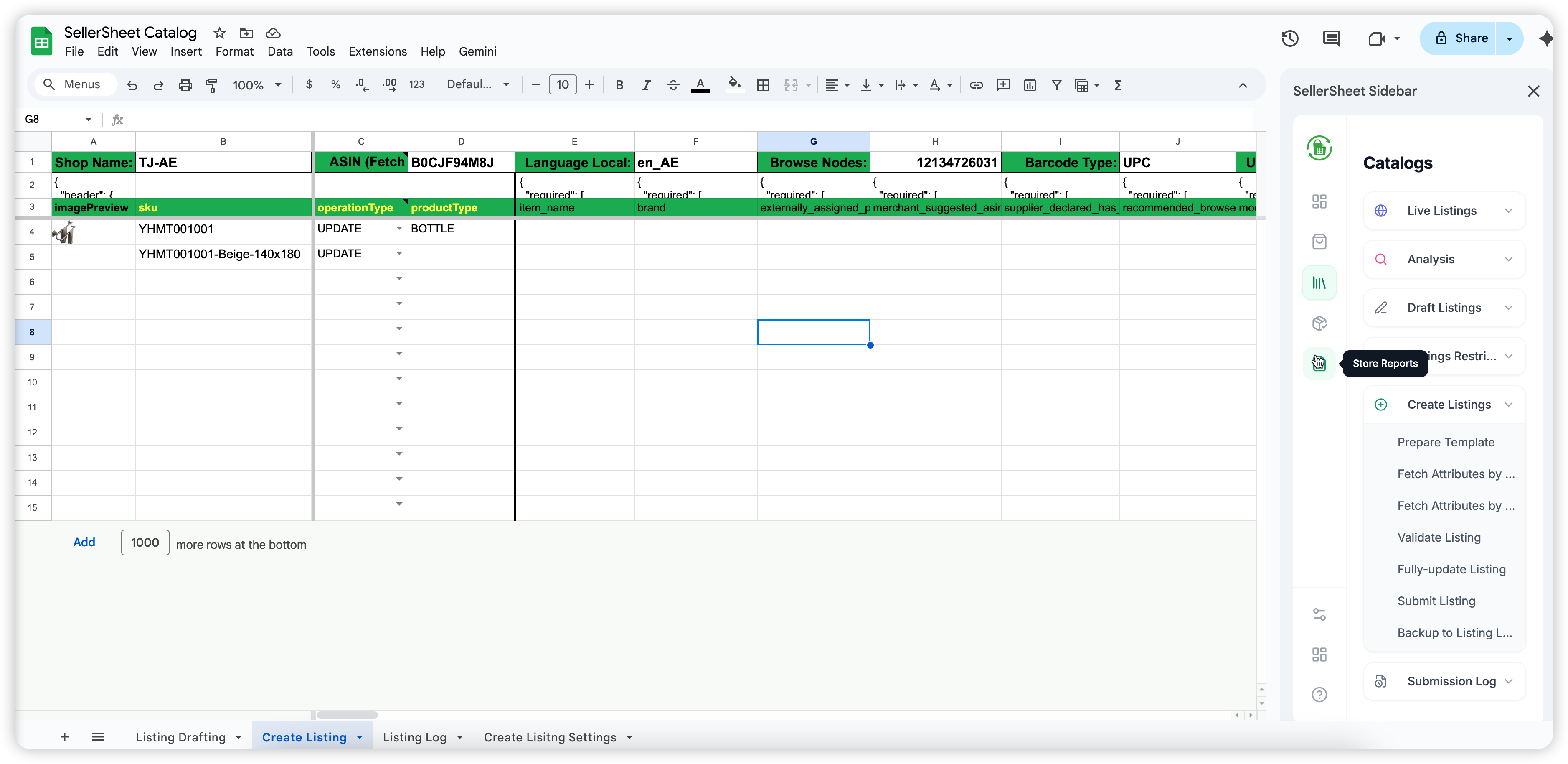
Required Columns: Store, SKU, ASIN (yellow text)
When multiple ASINs are put in each row, it will fetch the Image, Title, Bullet points, and Description for that ASIN respectively. Users can use the fetched values to analyze and compose their own listings.
Draft Listings Sheet
Create and optimize listing content using AI. Generate listings from images, optimize existing content, and translate for multiple marketplaces.
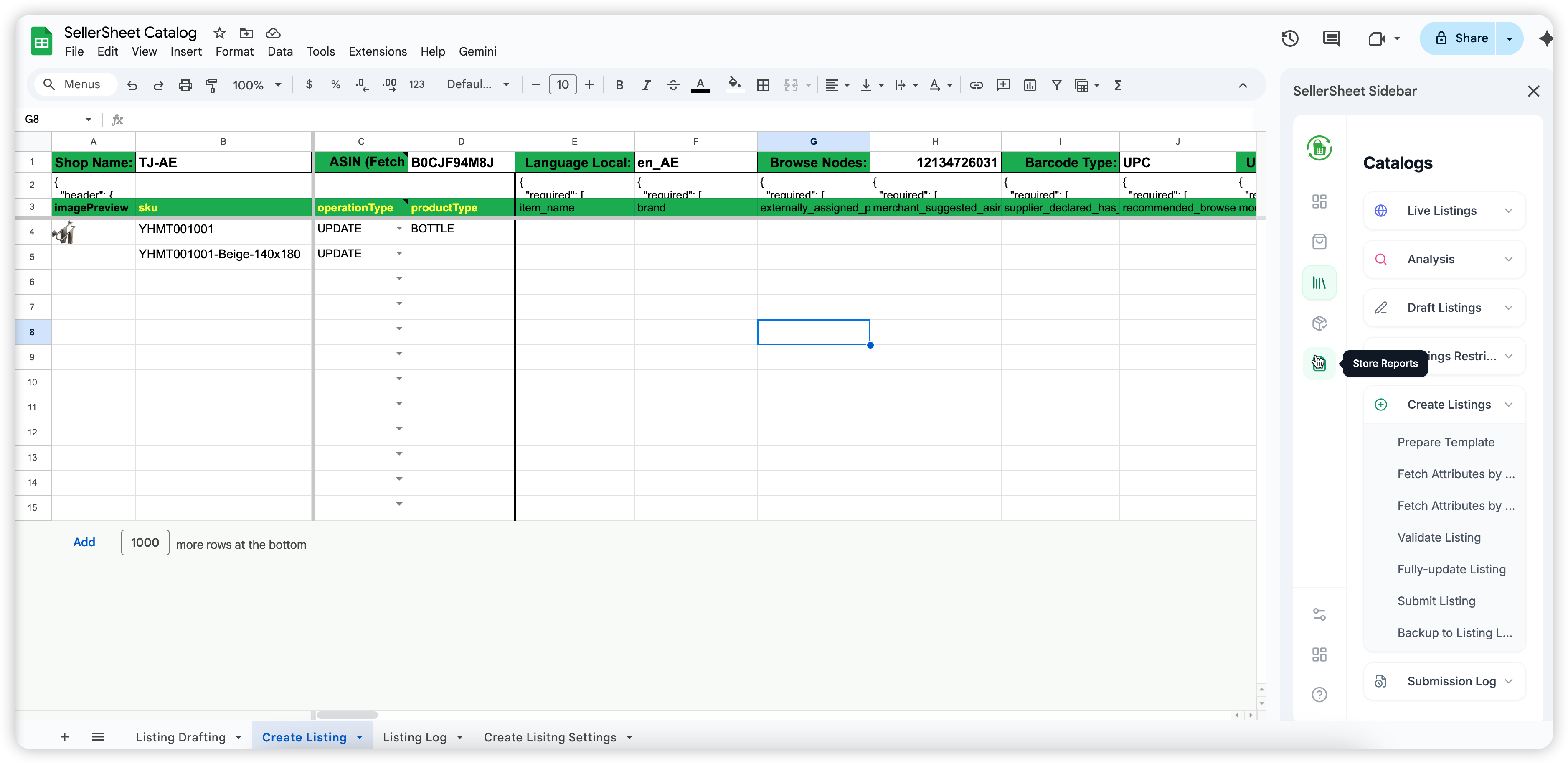
Listing Restrictions Sheet
Check for brand gating or category restrictions that may prevent listing creation.
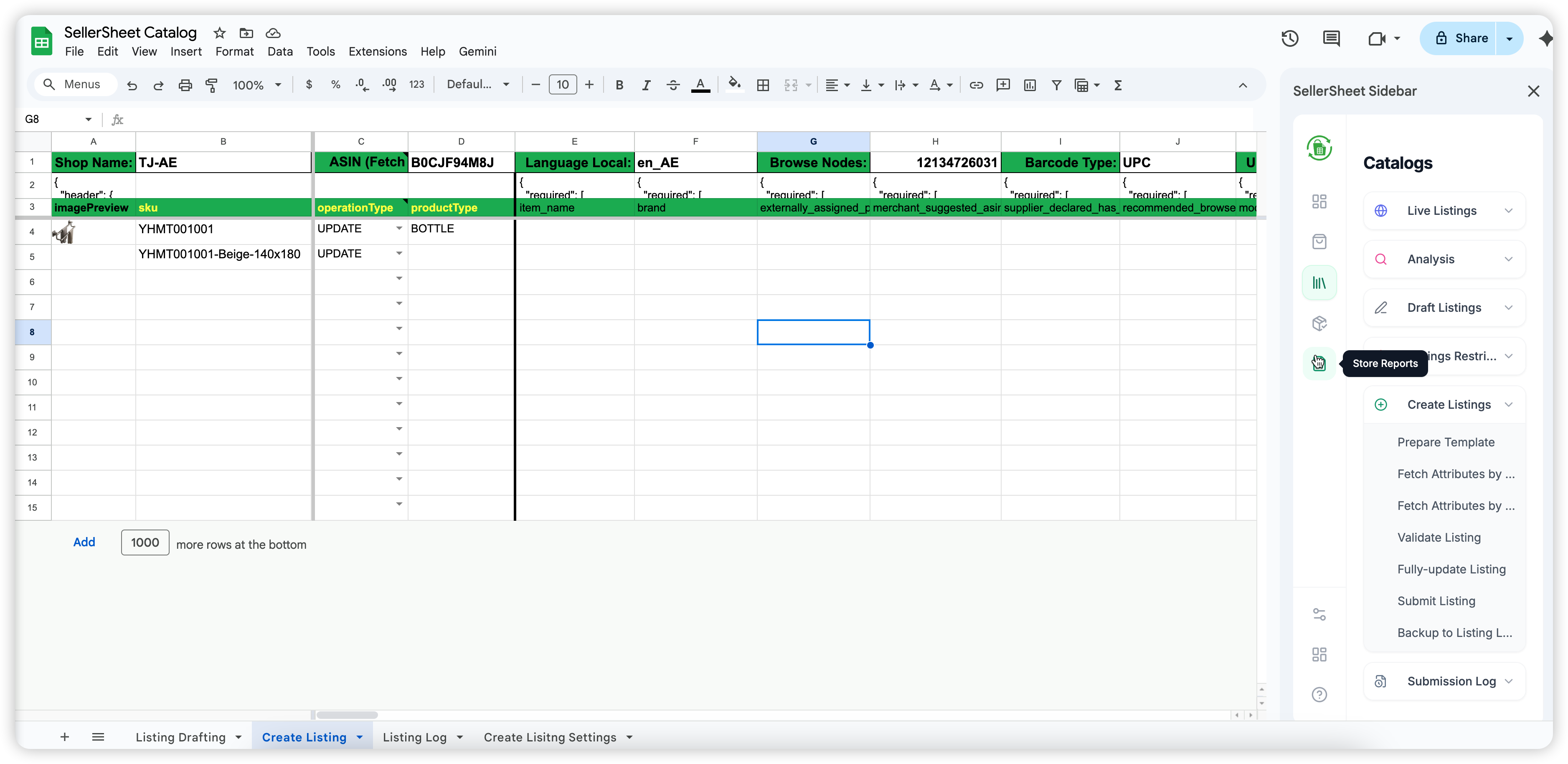
Related Guide: Learn how to use this sheet to automate your sourcing: How to Bulk Check ASIN Selling Eligibility in Google Sheets.
Create Listings Sheet
Prepare, validate, and submit new listings or update existing listings to Amazon. This sheet has a special structure with settings, productType definitions, and attribute rows.
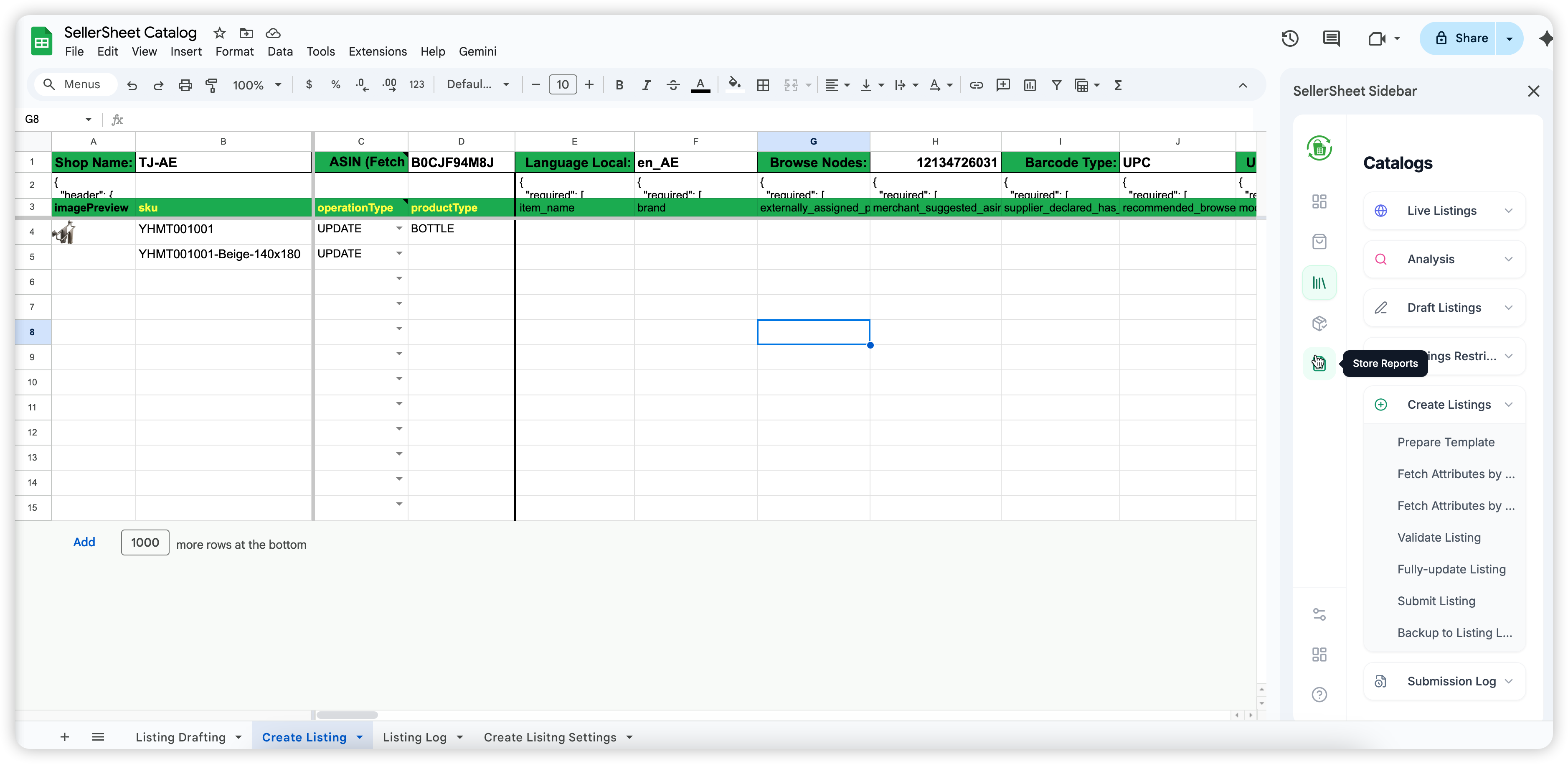
Sheet Structure:
- Row 1 (Settings): Contains basic settings like Shop Name, ASIN (Fetch browse node), Language Local, Browse Nodes, Barcode Type, Unit of Length, Unit of Weight, Unit of Capacity, Unit of Unit Count.
- Row 2 (ProductType Definitions): Starting from column 5, contains productType definition JSON for the attribute in Row 3. For example, E2 contains the productType definition for item_name (E3), which defines required fields and properties.
- Row 3 (Attribute Names): Contains attribute names required for creating/updating listings: imagePreview, sku, operationType, productType, item_name, brand, supplier_declared_has_product_identifier_exemption, externally_assigned_product_identifier, etc.
- Row 4+ (Data): Actual listing data rows starting from row 4.
Shop Name ASIN (Fetch browse node) Language Local Browse Nodes Barcode Type Unit of Length Unit of Weight Unit of Capacity Unit of Unit CountimagePreview sku operationType productType item_name brand supplier_declared_has_product_identifier_exemption externally_assigned_product_identifierSubmission Log Sheet
Track status of listing submissions (Feeds API). Monitor processing status and summaries.
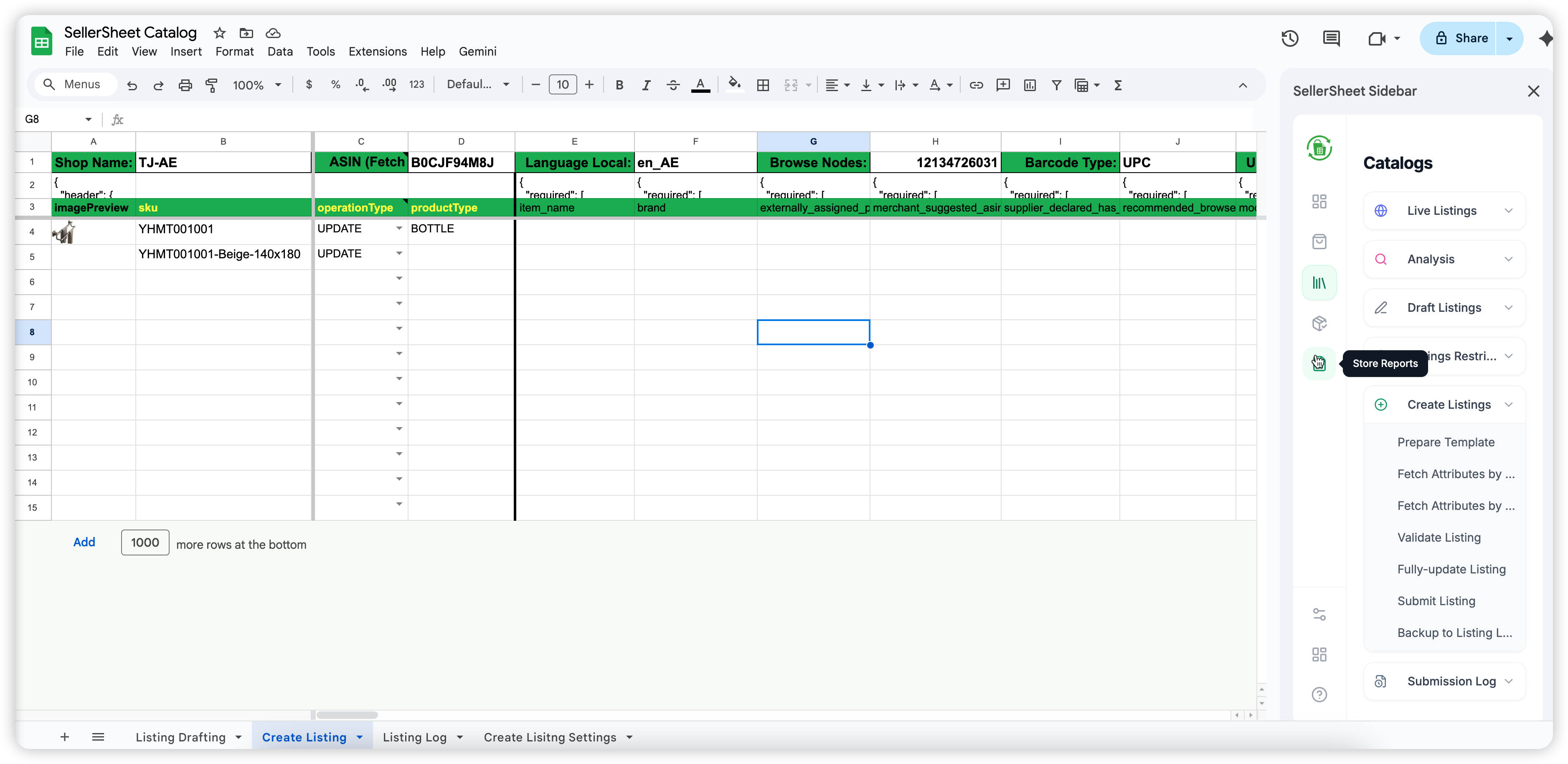
Auto-filled Columns: Submit Time, Store, Feed ID, Listing Backup, SKUs, Processing Status, Processing Summary (filled by Submit Listing button and updated by Update Log button)
User Input: Remark column is for users to record notes or comments about the submission.
Listing Log Sheet
Backup storage for submitted listings from Create Listings sheet. Contains a record of all listings that have been backed up.
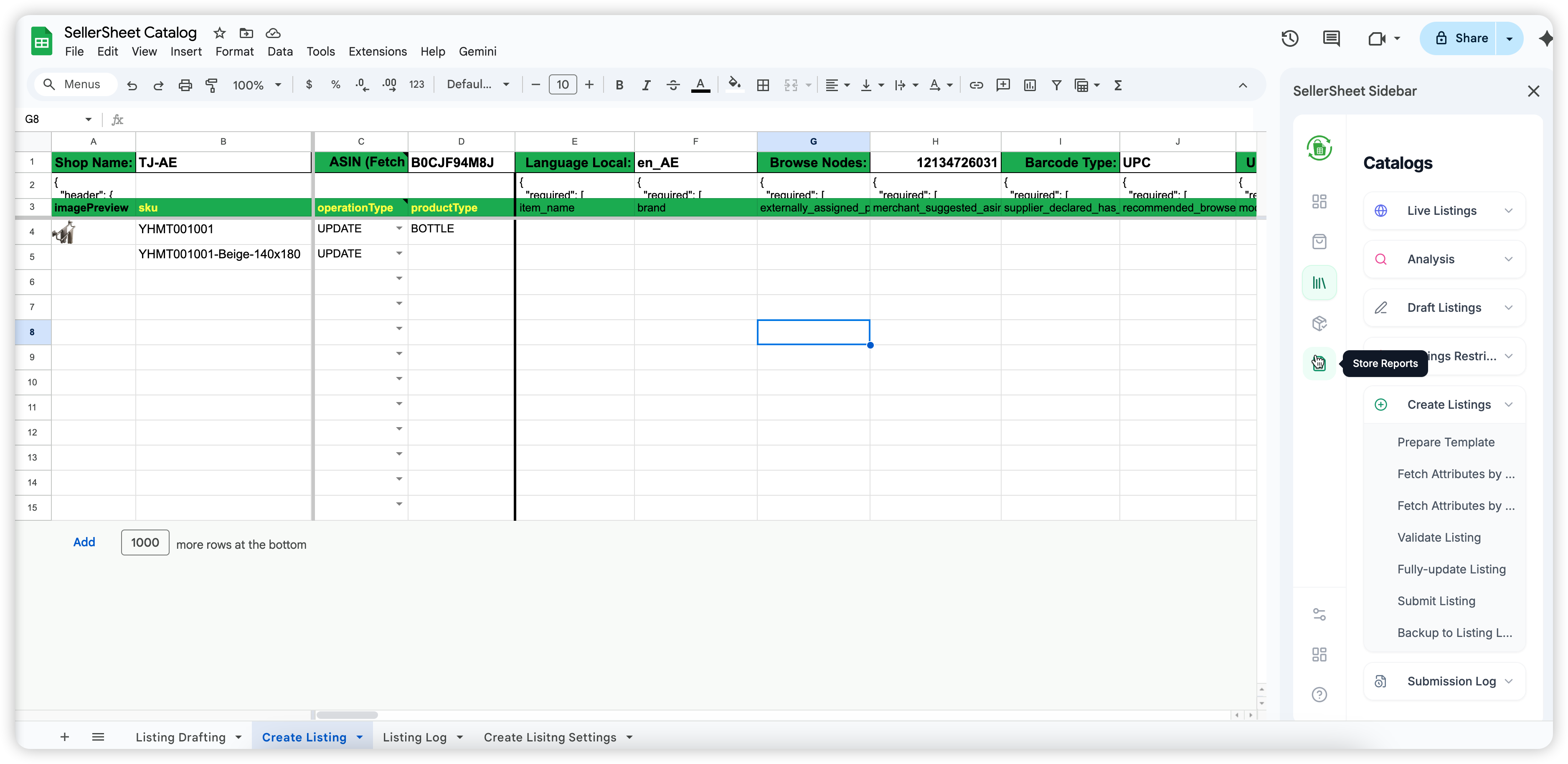
FBA Fulfillment
Streamline the inbound shipment workflow (Send to Amazon).
B2B Shipments
Manage packing lists (PL) and carton labels for B2B or direct orders.
- Upload Packing Lists via CSV
- Generate FBA/AMZ Carton Labels
- Track Shipment Status
Store Reports
Create on-demand reports, search for existing Amazon-generated reports, and schedule automated daily downloads — all saved directly to Google Drive with tracking in the spreadsheet. Covers inventory, financials, taxes, analytics, and business health reports.
For a full step-by-step tutorial with workflow comparisons, see the Store Reports Blog Guide.
Sidebar Buttons
Create Reports
Request new reports from Amazon with optional date ranges. Works in the Store Reports sheet.
Get Reports
Check status and download completed reports to Google Drive. Works in the Store Reports sheet.
Search Reports
Find existing Amazon-generated reports (e.g., settlement reports) by type and date range. Works in the Search Store Reports sheet.
Schedule Reports
Automate daily create-poll-download for snapshot-only reports. Works in the Report Scheduler sheet.
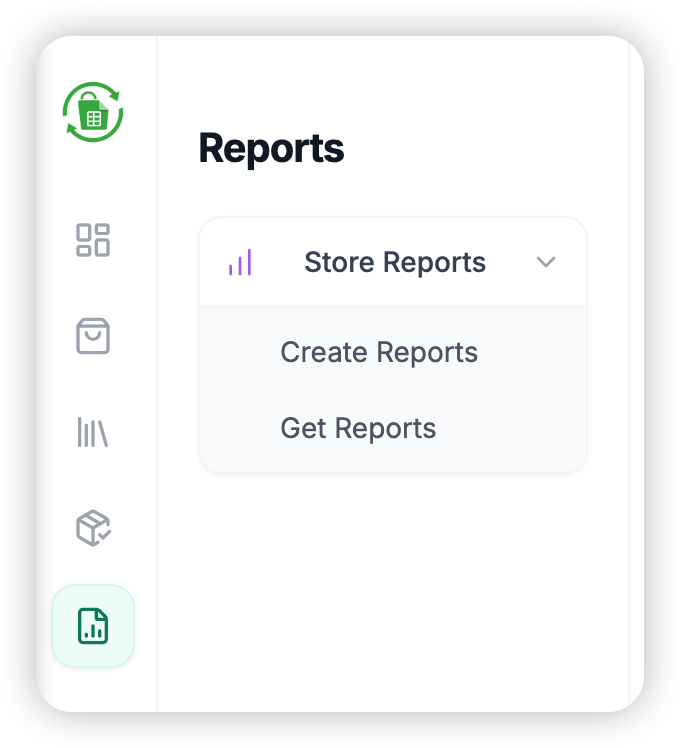
Store Reports Sidebar View
Spreadsheet Sheets
| Sheet Tab | Sidebar Button | Purpose |
|---|---|---|
| Store Reports | Create Reports, Get Reports | Request, track, and download Amazon reports on demand. |
| Store Report Type | (Reference only) | Look up available report names and their SP-API codes. |
| Search Store Reports | Search Reports | Find existing Amazon-generated reports by type and date range. |
| Report Scheduler | Schedule Reports | Automate daily report creation, polling, and download. |
Processing Status Values
- IN_QUEUE — Amazon has received the request. Wait and try Get Reports again.
- IN_PROGRESS — Amazon is preparing the report. Try again in a minute.
- DONE — Report is ready. SellerSheet downloads it to your Google Drive.
- CANCELLED — Report had no data or was cancelled by Amazon.
- FATAL — Error in request (wrong report name or missing required time frame).
How It Works
- 1
Go to the right sheet tab
Each button only works on its matching sheet.
- 2
Fill in the colored columns
Yellow = required, Light Yellow = optional, Gray = auto-filled
- 3
Click the sidebar button
SellerSheet processes all valid rows in the active sheet.
Store Reports Sheet
Request on-demand reports from Amazon and download them to Google Drive. Fill in Store and Report Name, click Create Reports, wait for Amazon to process, then click Get Reports to download.
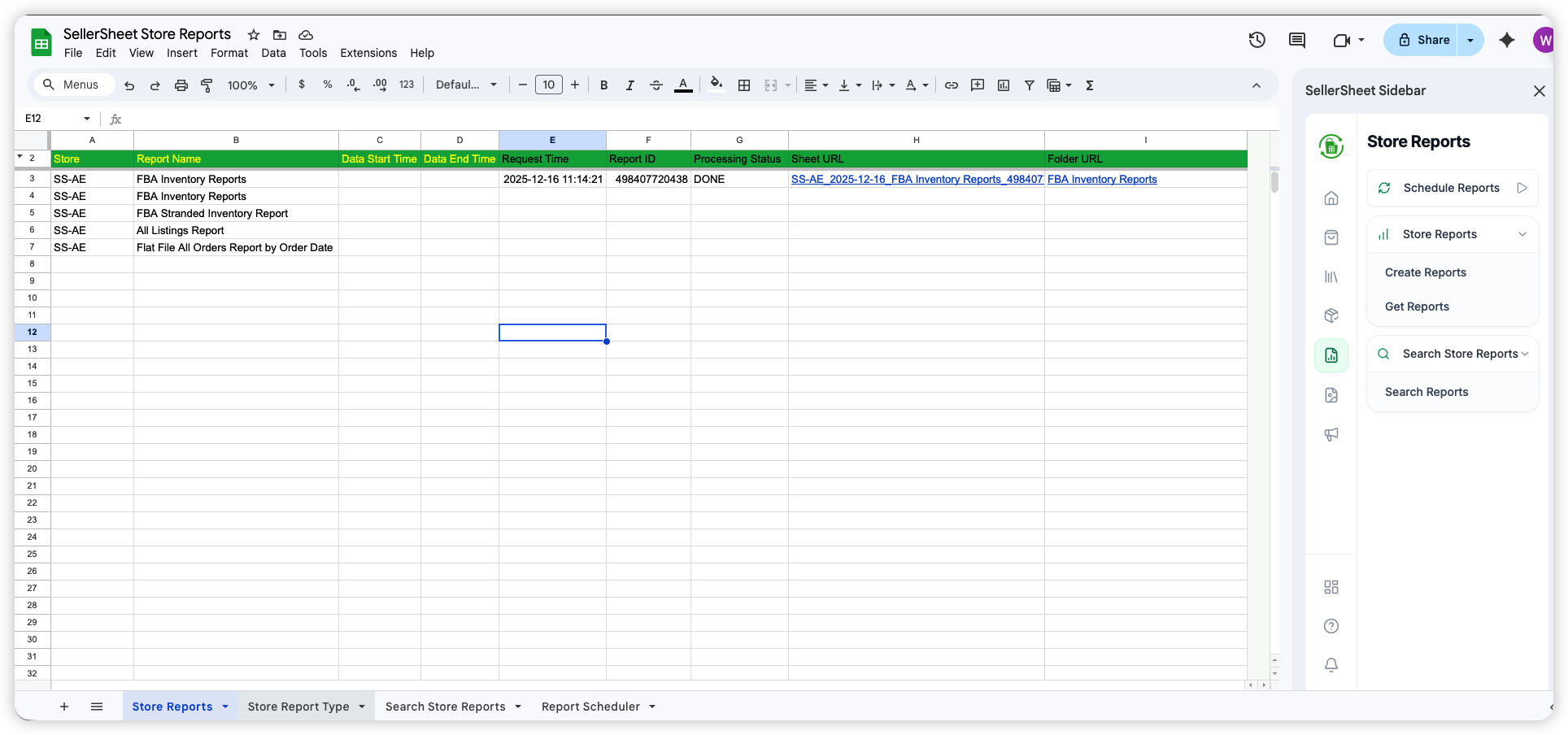
| Column | Type | Description |
|---|---|---|
| Store | Required | Your authorized store identifier (e.g., SS-AE). |
| Report Name | Required | Exact report name from the Store Report Type sheet or Report Name Map below. |
| Data Start Time | Optional | Start date for reports that require a time frame. |
| Data End Time | Optional | End date for reports that require a time frame. |
| Request Time | Auto | Timestamp when Create Reports was clicked. |
| Report ID | Auto | Amazon report ID. Rows with an existing ID are skipped by Create Reports. |
| Processing Status | Auto | Updated by Get Reports. See status values above. |
| Sheet URL | Auto | Clickable link to the downloaded report in Google Sheets. |
| Folder URL | Auto | Clickable link to the Google Drive folder containing the report. |
Time Frame Requirements: Some reports require Data Start Time and Data End Time, while others are snapshot-only. Check the Amazon SP-API documentation for report-specific requirements.
Store Report Type Sheet
A read-only reference of all available Amazon report types. Use this sheet to find the exact Report Name to copy into the Store Reports or Report Scheduler sheets. Each row shows the report name, SP-API code, seller/vendor availability, and date range requirements.
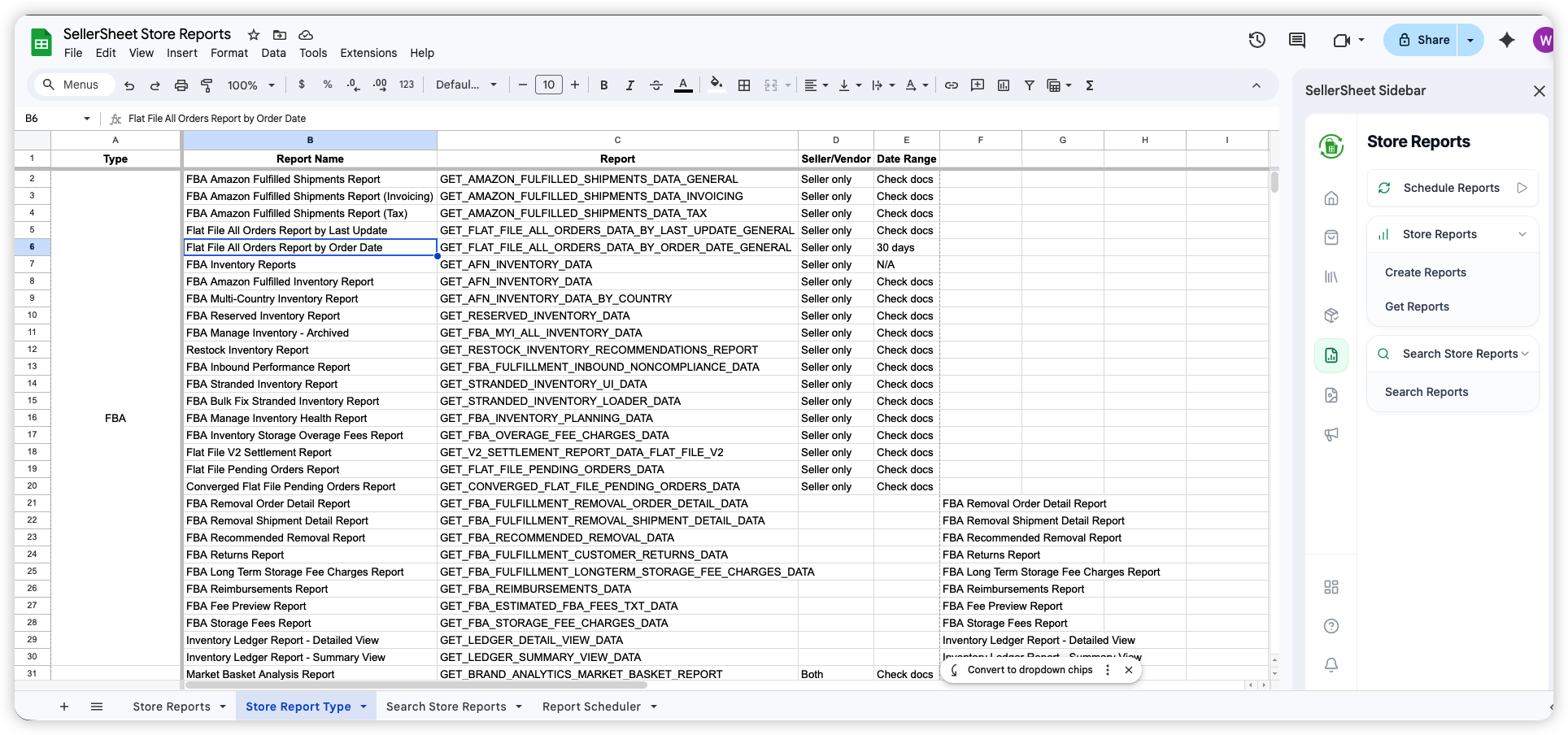
Search Store Reports Sheet
Find existing Amazon-generated reports — like settlement reports that you can't request yourself. Fill in your search criteria in Row 2, click Search Reports, and results appear in Row 4 onward. To download: copy the Report ID to the Store Reports sheet and click Get Reports.
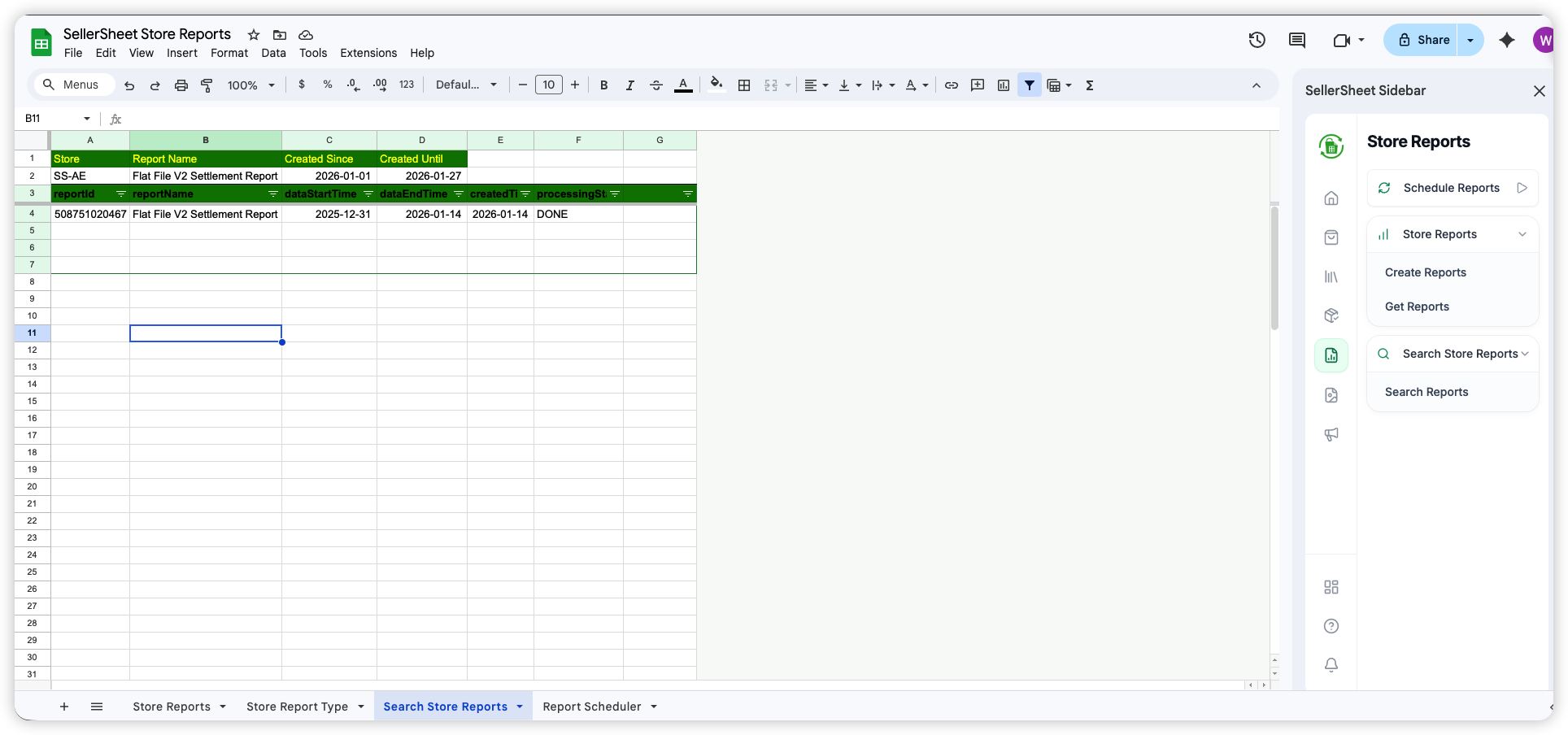
| Column (Row 2) | Type | Description |
|---|---|---|
| Store | Required | Store identifier. |
| Report Name | Required | Report type to search for. |
| Created Since | Optional | Only show reports created after this date. |
| Created Until | Optional | Only show reports created before this date. |
Sheet Structure
- Row 1: Technical headers (column identifiers).
- Row 2: Your search parameters (fill these in).
- Row 3: Result column headers (auto-generated).
- Rows 4+: Search results (Report ID, type, status, created time).
Report Scheduler Sheet
Automate daily report requests. Fill in Store and Report Name (snapshot-only reports), then click Schedule Reports. SellerSheet creates the request, polls every 30 seconds until complete, and downloads the report — all automatically. The next day, it updates the same spreadsheet in place so your dashboards stay connected.
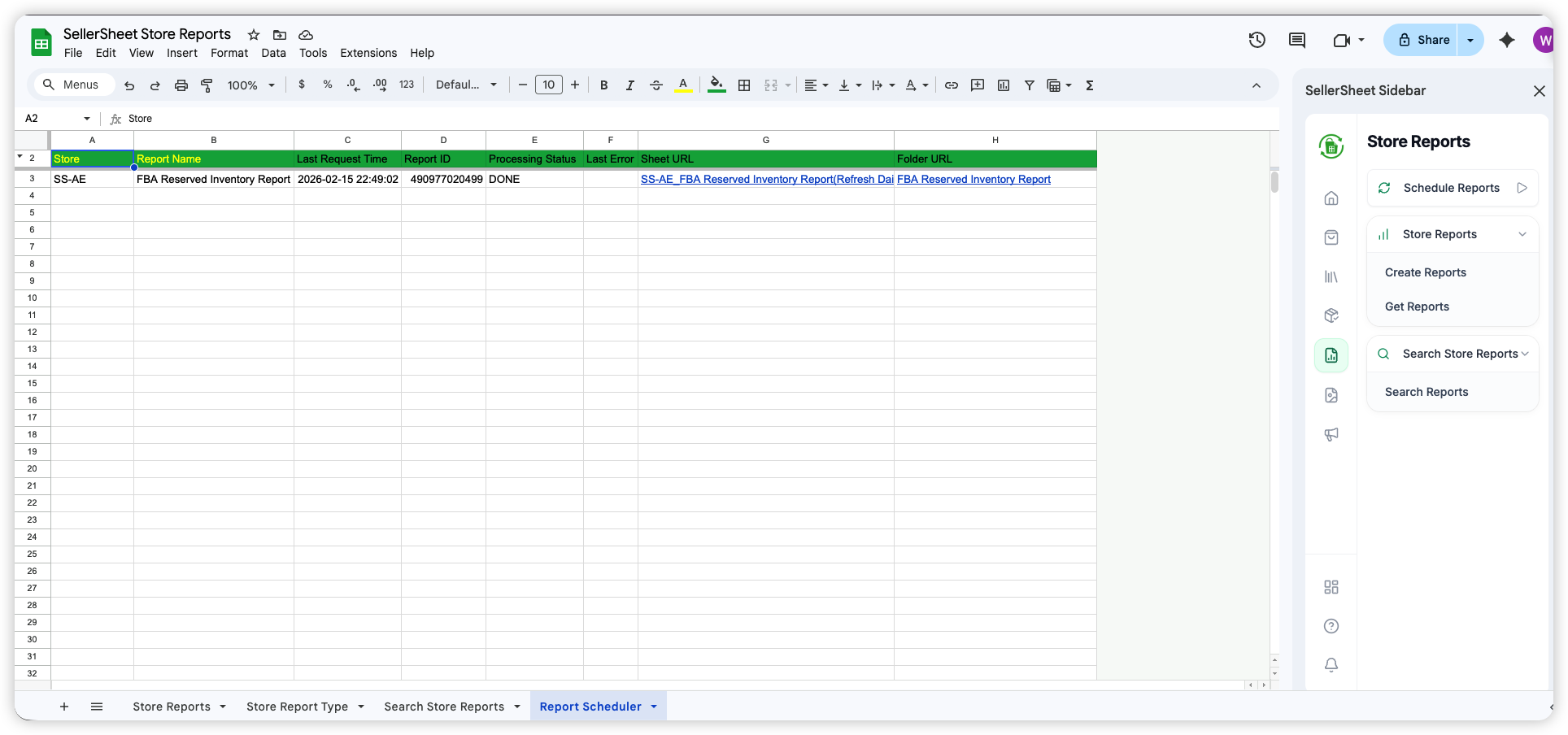
| Column | Type | Description |
|---|---|---|
| Store | Required | Your authorized store identifier. |
| Report Name | Required | Snapshot-only report (no date range required). |
| Last Request Time | Auto | Timestamp of last report request. Used by once-per-day guard. |
| Report ID | Auto | Amazon report ID from the latest request. |
| Processing Status | Auto | Auto-polled every 30s until DONE. |
| Last Error | Auto | Error messages if the request or download fails. |
| Sheet URL | Auto | Link to downloaded report. Same spreadsheet is reused daily. |
| Folder URL | Auto | Link to Google Drive folder containing the report. |
Snapshot Reports Only
The scheduler only supports reports that don't need a date range (e.g., active listings, inventory). For date-range reports, use Create Reports instead.
Once-Per-Day Guard
New reports are only created once daily, even if triggered multiple times. Your data refreshes automatically without duplicates.
Full Tutorial
For a complete step-by-step walkthrough with workflow comparisons, efficiency tips, and use-case examples, read the How to Create Store Reports in Google Sheets guide.
Report Name Map
Available report types organized by category. Use the exact Report Name from this table in the Store Reports sheet. Check the Amazon SP-API documentation for specific date range requirements.
| Type | Report Name | Report | Seller/Vendor | Date Range |
|---|---|---|---|---|
| FBA | FBA Amazon Fulfilled Shipments Report | GET_AMAZON_FULFILLED_SHIPMENTS_DATA_GENERAL | Seller only | Check docs |
| FBA Amazon Fulfilled Shipments Report (Invoicing) | GET_AMAZON_FULFILLED_SHIPMENTS_DATA_INVOICING | Seller only | Check docs | |
| FBA Amazon Fulfilled Shipments Report (Tax) | GET_AMAZON_FULFILLED_SHIPMENTS_DATA_TAX | Seller only | Check docs | |
| Flat File All Orders Report by Last Update | GET_FLAT_FILE_ALL_ORDERS_DATA_BY_LAST_UPDATE_GENERAL | Seller only | Check docs | |
| Flat File All Orders Report by Order Date | GET_FLAT_FILE_ALL_ORDERS_DATA_BY_ORDER_DATE_GENERAL | Seller only | 30 days | |
| FBA Inventory Reports | GET_AFN_INVENTORY_DATA | Seller only | N/A | |
| FBA Amazon Fulfilled Inventory Report | GET_AFN_INVENTORY_DATA | Seller only | Check docs | |
| FBA Multi-Country Inventory Report | GET_AFN_INVENTORY_DATA_BY_COUNTRY | Seller only | Check docs | |
| FBA Reserved Inventory Report | GET_RESERVED_INVENTORY_DATA | Seller only | Check docs | |
| FBA Manage Inventory - Archived | GET_FBA_MYI_ALL_INVENTORY_DATA | Seller only | Check docs | |
| Restock Inventory Report | GET_RESTOCK_INVENTORY_RECOMMENDATIONS_REPORT | Seller only | Check docs | |
| FBA Inbound Performance Report | GET_FBA_FULFILLMENT_INBOUND_NONCOMPLIANCE_DATA | Seller only | Check docs | |
| FBA Stranded Inventory Report | GET_STRANDED_INVENTORY_UI_DATA | Seller only | Check docs | |
| FBA Bulk Fix Stranded Inventory Report | GET_STRANDED_INVENTORY_LOADER_DATA | Seller only | Check docs | |
| FBA Manage Inventory Health Report | GET_FBA_INVENTORY_PLANNING_DATA | Seller only | Check docs | |
| FBA Inventory Storage Overage Fees Report | GET_FBA_OVERAGE_FEE_CHARGES_DATA | Seller only | Check docs | |
| Flat File V2 Settlement Report | GET_V2_SETTLEMENT_REPORT_DATA_FLAT_FILE_V2 | Seller only | Check docs | |
| Flat File Pending Orders Report | GET_FLAT_FILE_PENDING_ORDERS_DATA | Seller only | Check docs | |
| Converged Flat File Pending Orders Report | GET_CONVERGED_FLAT_FILE_PENDING_ORDERS_DATA | Seller only | Check docs | |
| Analytics | Market Basket Analysis Report | GET_BRAND_ANALYTICS_MARKET_BASKET_REPORT | Both | Check docs |
| Amazon Search Terms Report | GET_BRAND_ANALYTICS_SEARCH_TERMS_REPORT | Both | Check docs | |
| Repeat Purchase | GET_BRAND_ANALYTICS_REPEAT_PURCHASE_REPORT | Both | Check docs | |
| Sales and Traffic Report | GET_SALES_AND_TRAFFIC_REPORT | Seller only | Check docs | |
| Marketplace ASIN Page View Metrics | MARKETPLACE_ASIN_PAGE_VIEW_METRICS | Seller only | Check docs | |
| Inventory | All Listings Report | GET_MERCHANT_LISTINGS_ALL_DATA | Seller only | Check docs |
| Suppressed Listings Report | GET_MERCHANTS_LISTINGS_FYP_REPORT | Seller only | Check docs | |
| Pan-European Eligibility: FBA ASINs | GET_PAN_EU_OFFER_STATUS | Seller only | Check docs | |
| Performance | Promotions Performance Report | GET_PROMOTION_PERFORMANCE_REPORT | Both | Check docs |
| Coupons Performance Report | GET_COUPON_PERFORMANCE_REPORT | Both | Check docs | |
| Regulatory Compliance | EPR Monthly Report | GET_EPR_MONTHLY_REPORTS | Seller only | Check docs |
| EPR Quarterly Report | GET_EPR_QUARTERLY_REPORTS | Seller only | Check docs | |
| EPR Annual Report | GET_EPR_ANNUAL_REPORTS | Seller only | Check docs | |
| Tax | Amazon VAT Transactions Report | GET_VAT_TRANSACTION_DATA | Seller only | Check docs |
| Browse Tree | Browse Tree Report | GET_XML_BROWSE_TREE_DATA | Seller only | Check docs |
System Settings
Configuration for global preferences and account management.
- Workspace: Define Google Drive folder paths.
- Subscription: Manage billing and plan tiers.
- System Status: Check API connectivity health.
 Continue with Google
Continue with Google 
